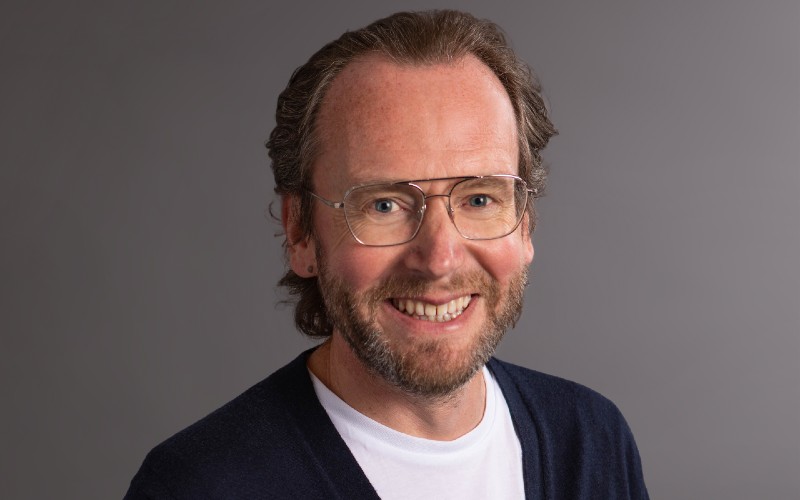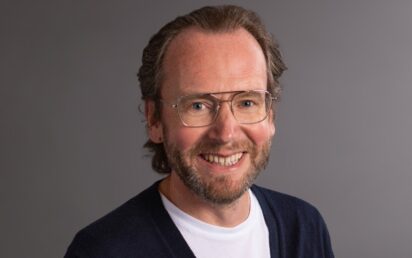Matthew Scullion is the award-winning CEO of tech unicorn Matillion.
In 2021 he was voted the EY Entrepreneur of the Year and has grown the company to 500 staff.
Our interview takes place in the company’s new 28,000 sq ft offices at Salford’s Two New Bailey, offering panoramic views of Manchester and the wider region.
They also have a sister-HQ in Denver, Colorado but Scullion has barely changed from the first time we met in 2012 at Matillion’s then offices in Booths Park, Knutsford.
The 44-year-old is the proud father of two daughters and shares the nickname they have for him.
“They call me Lord Sausage Head Pomegranate Sausage Sausage III,” he jokes. “My wife calls me Matthew.”
The personal story underlines the fact that while Matillion may be unrecognisable from when we first met, Scullion is fundamentally the same person.
“The day this office opened, within three minutes of passing through the front door, I was on a Zoom call working,” he explains.
He co-founded Matillion in 2011 with chief technology officer Ed Thompson after the pair quit their jobs to change the world of business intelligence.
Fast forward a decade to 2021 and they joined the ranks of Manchester’s tech unicorns when a $150m fundraise valued the business at $1.5bn.
Matillion is fundamentally a data software company with a goal to drive business performance.
Scullion loves an analogy. “It’s refining data from iron ore into steel so it’s ready to use,” he says. “That process is called data engineering and the world doesn’t have enough data engineers.”
Put another way, the world has an inexhaustible appetite for data but the reliance on data engineers means it can never be quenched.
It’s the reason why Matillion took the game-changing decision in 2014/15 to make their own software and start the journey to becoming a unicorn.
“The technology we built and launched in 2015, and have been launching ever since, wildly increases the productivity of data engineers and makes them much more productive,” he explains.
Recalling how they decided to build their own software he says: “We’d been building data warehouses in the cloud and we found it harder than we thought it should be.
“Assuming that someone had sorted this product out already, we went to try and buy it but couldn’t find it.
“This problem was slowing our boat down so we decided to solve it for ourselves. We created a piece of software that was codenamed Project Emerald.
“We built it for our own use because we were personally experiencing this problem.
“It took about a year to build, tried it out for our own use in January 2015 and it worked really well.
“It massively increased our productivity of building data warehouses.”
At the time the company employed around 12 people and had an ARR of less than $1m.
Now the company has offices all over the world, employs 500 staff and has revenues of around $100m.
Having the ability to make their own software took Matillion to a different level.
“The scaling economics of software companies are very efficient and large so you can build a very big company doing it,” says Scullion.
“There are at least 60,000 companies in North America and Western Europe (our target markets) that are applicable for using our software. So far about 1,500 do.”
Although Scullion has the same values he had when we first met in 2012, he admits other traits are unrecognisable.
“I heard a great line the other day,” he says. “I think it was from an Australian hedge fund manager. He said he likes ‘to be disgusted with the person he was two years ago’ and I think that’s really powerful.
“In business, if you’re doing the same stuff you were two years ago, what have you been doing? You have to learn from others but also through your own experiences.
“The skills required to run a Sunday league football team, are different to the Championship and are different to the Premiership.
“If you want to be with the business in that whole journey you need to learn what each of those skills are at different times.
“You asked if being a unicorn is meaningful. It’s meaningful but mostly because it represents a superb marketing opportunity.
“There are less unicorn founder CEOs than there are people who have been to space. There’s a scarcity value.
“I don’t like to think of where we are. In the context of UK technology companies I think we’re depressingly high up in the Premier League.
“That’s not a reflection on us, it’s a reflection on the rest of the UK tech ecosystem. Of course there are bigger companies than us but not many.
“It worries me that I’m often the person who gets invited down to Downing Street or to be on the advisory panel because we’re seen as an outside success story.”
By comparison in the US Databricks – which invested in Matillion – is valued at $43bn and Snowflake has a market cap of $47bn.
By his own admission Scullion is no Elon Musk. “I try not to drink my own Kool-Aid,” he says. “I don’t think it’s very attractive, I don’t think it makes the boat go faster and I don’t believe it.”
It was at this point he revealed his daughters refer to him as Lord Sausage Head Pomegranate Sausage Sausage III.
“I was lucky enough to win EY Entrepreneur of the Year a few years ago,” he says. “They give you a holiday to Monaco and you get to take your family.
“I took my wife and two daughters to Monaco and there were signs up on the street lamps with your face on it.
“My kids were like ‘Daddy you’re famous’. I said I’m definitely not famous and one day my eldest daughter said to Alexa ‘who is Matthew Scullion? and Alexa said ‘Matthew Scullion is the CEO of Matillion’.”
Scullion laughs at the story and insists he’s still not famous.
wejo
Earlier this year another one-time Manchester unicorn – wejo – went into administration and Scullion believes investor sentiment has changed from ‘growth at any cost’ to more emphasis on profitability.
The CEO says he has no insight into what happened at wejo but admits raising investment has become a lot harder in recent years.
“There was a free money party because interest rates were super low,” he says. “There was no point in putting them in government bonds because you’re weren’t going to get a return.
“The trillion dollar capital pools around the world put a greater percentage of their money into alternative investment classes, such as venture capital.
“More dollars into the VC pot, a similar number of companies (mean) prices go up. Supply and demand.
“Then Covid ends, there’s a war in Ukraine and other macroeconomic movements take place and to curtail inflation, interest rates go up.
“Suddenly the people in charge of investing those trillion dollar pools of capital get a 5 per cent return and no risk for putting it into a government bond or a 10 per cent and high risk for putting it into a VC. (The result is) more of the money goes into government bonds and less into a VC.
“The proportion doesn’t need to change much for that to be billions and billions of dollars that was (previously) flowing into VC. Less money, same number of companies (mean) prices go down.
“I think prices today are closer to sensible than they were in 2021 and the first half of 2022, which was the top of the bubble.”
However Scullion refuses to blame investors.
“Another British disease in my opinion is we blame investors when they don’t want to give us money,” he says. “Ultimately it’s down to us as businesses and entrepreneurs to create companies that are investable.”

